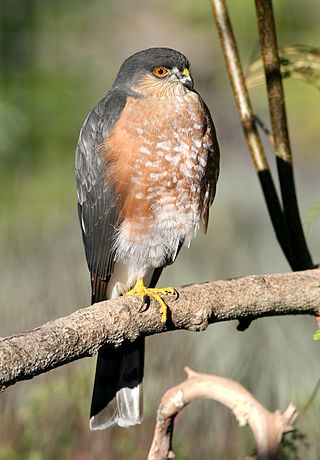
The sharp-shinned hawk or northern sharp-shinned hawk, commonly known as a sharpie, is a small hawk, with males being the smallest hawks in the United States and Canada, but with the species averaging larger than some Neotropical species, such as the tiny hawk. The taxonomy is far from resolved, with some authorities considering the southern taxa to represent three separate species: white-breasted hawk, plain-breasted hawk, and rufous-thighed hawk. The American Ornithological Society and some other checklists keeps all four variations conspecific.

Short ribs are a cut of beef taken from the brisket, chuck, plate, or rib areas of beef cattle. They consist of a short portion of the rib bone and the surrounding meat, which varies in thickness. There are two major types of cuts: the "flanken", which is cut across the bone and leaves the bone just .5 to 2 inches or less in length, and the "English", which is cut parallel to the bone and leaves the bone up to 6 inches (15 cm) in length. English cut short ribs may be served individually, or three or four may be served connected to one another. Short ribs are popular in many international cuisines.

The anterior olfactory nucleus is a portion of the forebrain of vertebrates.

The black-tailed nativehen is a rail native to Australia.

The rufous-tailed hawk is a species of bird of prey in the family Accipitridae.

The Hispaniolan parrot, also known as Hispaniolan amazon, is a species of psittaciform bird of the family Psittacidae endemic to Hispaniola, which includes the Dominican Republic and Haiti. Its white forehead, light beak, white eye-ring, blue ear patch, and maroon belly patch are the main features that differentiate it from other amazons. Its body measures about 28 centimeters in length. A typical adult weighs 250g (8.75 oz).
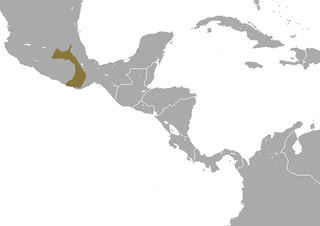
The chestnut-bellied shrew is a species of mammal in the family Soricidae. It is endemic to Mexico.
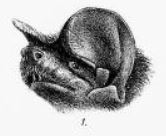
The African giant free-tailed bat, or African free-tailed bat is a species of bat in the family Molossidae. It is found in Democratic Republic of the Congo, Eritrea, Ethiopia, Kenya, Malawi, Mozambique, South Sudan, Tanzania, Zambia, Zimbabwe, and possibly South Africa. Its natural habitats are dry savanna and subtropical or tropical dry shrubland.
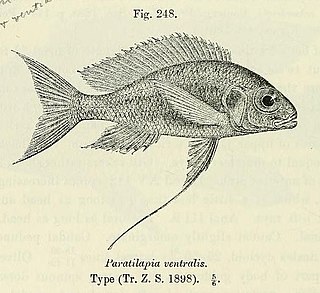
Ophthalmotilapia ventralis is a species of cichlid endemic to Lake Tanganyika where it is only known from the southern end of the lake. It can reach a length of 15 centimetres (5.9 in) TL. It can also be found in the aquarium trade.

The eastern glass lizard is a species of legless lizard in the family Anguidae and the longest and heaviest species of glass lizards in the genus Ophisaurus, endemic to the Southeastern United States. The streamlined, legless species is often confused with snakes. Glass lizards differ from snakes as they possess a moveable eyelid and an external ear opening as well as a lateral groove that separates the different types of scales on the animal, all three of these features are absent in snakes. Snakes also have flexible jaws while lizards do not. Ventralis comes from the Latin "venter" meaning belly; this is in reference to the snake-like movement.

Rhyzobius ventralis, common names including black lady beetle, gumtree scale ladybird, is a ladybird species endemic to Tasmania and all the mainland states of Australia except the Northern Territory. It is also found in New Zealand, but not naturally. The earliest New Zealand record is Auckland, 1898

Diastictis ventralis, the white-spotted brown moth, is a species of moth in the family Crambidae. It is found in eastern North America.
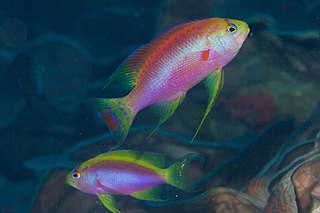
Pseudanthias ventralis, the longfin anthias or longfin basslet', is a species of marine ray-finned fish, an Pseudanthias from the subfamily Anthiinae part of the family Serranidae, the groupers and sea basses. It is found in the Western Pacific Ocean.
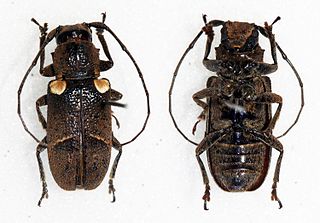
Prosoplus is a genus of longhorn beetles of the subfamily Lamiinae, containing the following species:
Prosoplus atlanticus is a species of beetle in the family Cerambycidae. It was described by Stephan von Breuning in 1938.
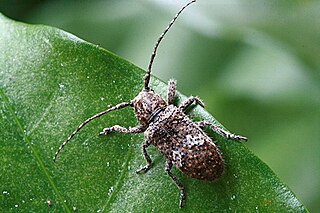
Rhytiphora bankii is a species of beetle in the family Cerambycidae. It was first described by Johan Christian Fabricius in 1775, under the genus Lamia. It is known from Australia, the Philippines, Borneo, Java, Micronesia, New Guinea, Hawaii, Moluccas, Sumatra, Vietnam, and has been introduced into Japan. The Australian species of Prosoplus were synonymised with Rhytiphora in 2013.
Prosoplus costatus is a species of beetle in the family Cerambycidae. It was described by Karl-Ernst Hüdepohl in 1996. It is known from Borneo and Malaysia.
Prosoplus dentatus is a species of beetle in the family Cerambycidae. It was described by Guillaume-Antoine Olivier in 1792. It is known from Mauritius, Seychelles, Réunion, and Madagascar. It contains the varietas Prosoplus dentatus var. ochreomaculatus.
Prosoplus lividus is a species of beetle in the family Cerambycidae. It was described by Masaki Matsushita in 1935.
Prosoplus sinuatofasciatus is a species of beetle in the family Cerambycidae. It was described by Blanchard in 1855.














